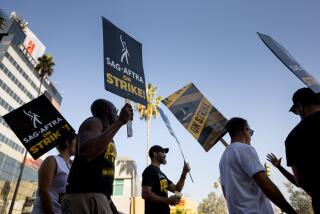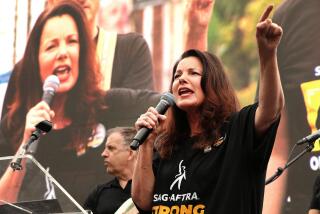Countdown to a walkout
It was 9:15 p.m. on Sunday and negotiators for the major studios and TV and film writers had spent nearly 10 hours holed up in the Sofitel Hotel in West Hollywood trying to sew up an eleventh-hour deal.
Studio officials who had been huddling among themselves were about to return to the bargaining table when the bombshell hit: East Coast writers had sent out an e-mail telling the world that the strike had begun in their time zone, at 12:01 a.m.
Alarmed, chief studio negotiator Nick Counter confronted his writers guild counterpart, David Young, in the hallway.
“Are you guys willing to stop the clock” and delay the strike so that negotiations can continue, he asked.
Young was blunt: “I said no. We’re willing to keep negotiating until we reach a deal, but we’re not postponing a strike.”
Counter and his colleagues considered further talks futile. The meeting ended abruptly, dashing hopes for a last-minute resolution to three months of contentious negotiations that ultimately went nowhere.
The consequences were felt far and wide on Monday as writers fanned out across New York and Los Angeles, forming picket lines at scores of locations, including Paramount Pictures, Sony Pictures, CBS Television City and Warner Bros. in L.A., as well as NBC’s headquarters in Manhattan’s Rockefeller Center.
Amid the protests, there were no indications that the parties would be returning to the table any time soon, setting the stage for what many believed would be a long and costly strike.
“We’re prepared to do whatever it takes for as long as it takes,” said Young, adding that the guild would return to negotiations only if the studios were ready to seriously respond to the writers’ proposals. “We should get together and keep moving forward, but it takes two sides.”
For his part, Counter said Monday that no negotiations were possible as long as strikers were on the streets. Some TV studios, including Fox, ratcheted up the ill will by informing some of their star writers on Monday that compensation for overhead and development would be suspended, according to several people informed of the plan.
Sunday’s meeting resulted from back-channel talks between top writers and studio executives, who pushed for one last attempt to make a deal. Negotiations had broken down on Wednesday, just hours before the writers’ three-year contract expired at midnight.
At Wednesday’s meeting the studios had told the guild that negotiations could not move forward unless they were willing to take one of the major issues off the table: their demand to double the home-video residuals writers receive.
Writers now get about 5 cents for every DVD sold, with studios paying out nearly $60 million in residuals a year to the West Coast guild.
Studios maintain that they can’t forfeit any more of their DVD proceeds because they help offset rising marketing and production costs of movies and TV shows.
Writers balked at the demand, arguing that they had long been shortchanged by a formula that was adopted in 1985. When the home video market boomed and later DVD sales soared, writers felt cheated.
They say they are determined not to make that mistake again now that digital technology and the Internet are transforming the way entertainment is delivered.
With that in mind, guild leaders decided Sunday to focus their efforts on future revenues -- that is, new media pay -- rather than on DVD sales, which have peaked.
At about 2 p.m. Sunday, three hours into the meeting, they took their DVD demand off the table. They did so when it appeared negotiators had made modest headway on a few issues.
For example, they discussed a studio proposal to pay writers 1.2% of license fees on shows that are streamed online. Currently writers aren’t paid anything for free streaming of shows, a major sticking point.
By late afternoon, however, negotiators for the writers were growing increasingly frustrated that studios had not responded in kind to their DVD concession, and hadn’t proposed a new pay package.
While the studios were receptive to the concept of extending the union’s jurisdiction to writing for some areas of the Web and other new media platforms, they refused to outline specific pay terms and conditions, Young said.
Guild negotiators took particular exception to a proposal that would allow studios to rerun full-length movies and TV shows on the Internet and other platforms for promotional purposes without paying residuals.
Studios also proposed paying writers the same unpopular DVD rate for Internet downloads, arguing that the business was too new to determine if higher payments were justified.
A top industry veteran with contacts on both sides of the dispute said he received a call at 6:30 p.m. from a writers guild executive at the meeting who said, “This is it, we’ve had it.”
Fifteen minutes later, the executive said he received an upbeat assessment from one of the studio negotiators.
“It’s a perfect example of their dysfunction,” said the person who received the calls. He asked not to be named because the conversations were confidential.
On Monday, officials from both sides reflected on Sunday’s meeting.
“We were totally blind-sided by their announcement that they went on strike in New York at a point in time when we were in negotiations and making some progress,” Counter said, noting that the studios offered concessions in several areas, including increases in minimum pay and health and pension benefits and a potential pay structure for streaming shows online.
For his part, Writers Guild President Patric M. Verrone said, “The feeling was there wasn’t enough progress here to justify stopping the strike.”
Many believed Sunday’s meeting was doomed from the start. The two chief negotiators, Young and Counter, sparred openly for months before talks even began, with Counter blasting Young over the union’s organizing efforts and his reluctance to begin negotiations earlier in the year.
When they started talks in July, the two sides immediately alienated each other by making what the opposition viewed as outrageous demands.
Studio executives bristled when writers sought to double their share of home video revenues. And writers were furious when studios fired back with their proposal to overhaul the decades-old residuals payment system. Even when studios subsequently backed off of that proposal, the writers continued to fume.
Last week, with the strike deadline looming, a federal mediator was brought in.
But in the end, even he couldn’t salvage the situation.
Nor could some top writers and studio chiefs such as News Corp. President Peter Chernin, Warner Bros. Chairman Barry Meyer and Walt Disney Co. Chief Executive Bob Iger.
By the time negotiators sat across from each other at the Sofitel, they faced a race against the clock: accomplishing in 12 hours what they couldn’t do in three months.
RELATED STORY Walkout: Productions halt as picket lines form. A1Continuous updates: Find the latest news at latimes.com/hollywoodwriters







